"The Unknown Citizen" is a poem written by W. H. Auden in 1939, shortly after he moved from England to the United States. The poem was first published on January 6, 1940 in The New Yorker, and first appeared in book form in Auden's collection Another Time . The poem is the epitaph of a man identified only by a combination of letters and numbers somewhat like an American Social Security number ("JS/07/M/378"), who is described entirely in external terms: from the point of view of government organizations such as the fictional "Bureau of Statistics." The speaker of the poem concludes that the man had lived an entirely average, therefore exemplary, life. The poem is a satire of standardization at the expense of individualism. The poem is implicitly the work of a government agency at some point in the future, when modern bureaucratizing trends have reached the point where citizens are known by arbitrary numbers and letters, not personal names.

The Shield of Achilles is a poem by W. H. Auden first published in 1952, and the title work of a collection of poems by Auden, published in 1955. It is Auden's response to the detailed description, or ekphrasis, of the shield borne by the hero Achilles in Homer's epic poem the Iliad.
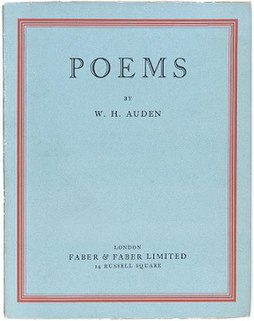
Poems is the title of three separate collections of the early poetry of W. H. Auden. Auden refused to title his early work because he wanted the reader to confront the poetry itself. Consequently, his first book was called simply Poems when it was printed by his friend and fellow poet Stephen Spender in 1928; he used the same title for the very different book published by Faber & Faber in 1930, and by Random House in 1934.

Spain is a poem by W. H. Auden written after his visit to the Spanish Civil War. Spain was described by George Orwell as "one of the few decent things that have been written about the Spanish war". It was written and published in 1937. Auden donated all the profits from the sale of Spain to the Spanish Medical Aid Committee.
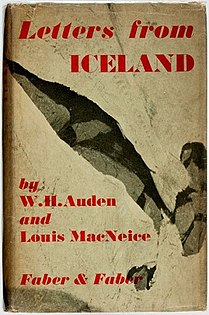
Letters from Iceland is a travel book in prose and verse by W. H. Auden and Louis MacNeice, published in 1937.
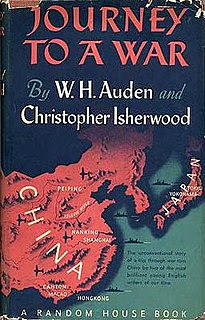
Journey to a War is a travel book in prose and verse by W. H. Auden and Christopher Isherwood, published in 1939.
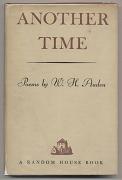
Another Time is a book of poems by W. H. Auden, published in 1940.
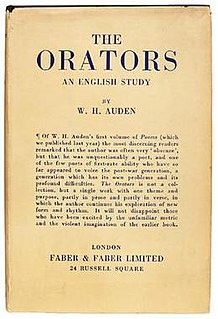
The Orators: An English Study is a long poem in prose and verse written by W. H. Auden, first published in 1932. It is regarded as a major contribution to modernist poetry in English.

On This Island is a book of poems by W. H. Auden, first published under the title Look, Stranger! in the UK in 1936, then published under Auden's preferred title, On this Island, in the US in 1937. It is also the title of one of the poems in the collection.
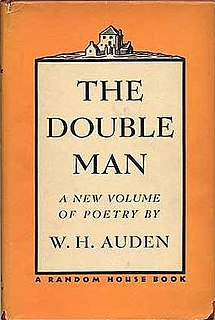
The Double Man is a book of poems by W. H. Auden, published in 1941. The title of the UK edition, published later the same year was New Year Letter.
"The Sea and the Mirror: A Commentary on Shakespeare's The Tempest" is a long poem by W.H. Auden, written 1942–44, and first published in 1944. Auden regarded the work as “my Ars Poetica, in the same way I believe The Tempest to have been Shakespeare’s.”

"For the Time Being: A Christmas Oratorio", is a long poem by W. H. Auden, written 1941-42, and first published in 1944. It was one of two long poems included in Auden's book also titled For the Time Being, published in 1944; the other poem included in the book was "The Sea and the Mirror."

Nones is a book of poems by W. H. Auden published in 1951 by Faber & Faber. The book contains Auden's shorter poems written between 1946 and 1950, including "In Praise of Limestone", "Prime", "Nones," "Memorial for the City", "Precious Five", and "A Walk After Dark".
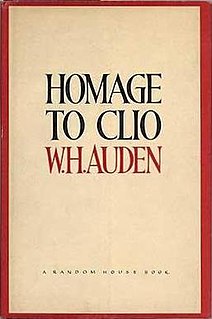
Homage to Clio is a book of poems by W. H. Auden, published in 1960.
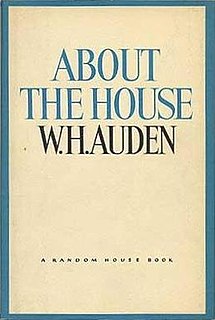
About the House is a book of poems by W. H. Auden, published in 1965 by Random House.
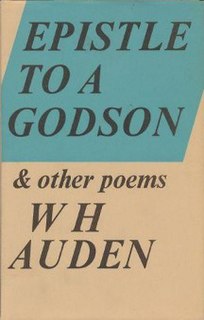
Epistle to a Godson and other poems is a book of poems by W. H. Auden, published in 1972.

Thank You, Fog: Last Poems by W. H. Auden is a posthumous book of poems by W. H. Auden, published in 1974.
This is a bibliography of books, plays, films, and libretti written, edited, or translated by the Anglo-American poet W. H. Auden (1907–1973). See the main entry for a list of biographical and critical studies and external links.
Bucolics is a sequence of poems by W. H. Auden written in 1953 and 1953. The seven poems in the sequence are: "Winds", "Woods, "Mountains", "Lakes", "Islands", "Plains", and "Streams".


















